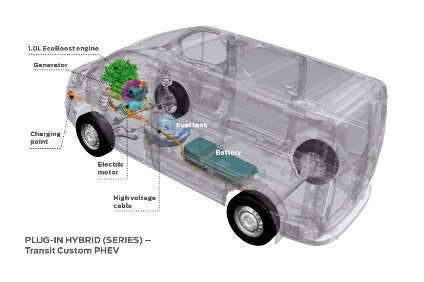
Ford’s new plug-in hybrid electric (PHEV) Transit Custom van, intended to help improve local air quality by running solely on electric power for the majority of city journeys, has been shown at the Cenex Low Carbon Vehicle 2017 event in Millbrook, England.
The vehicle mades its first appearance as the automaker prepares 20 PHEV Transit vans for a year long fleet customer trial in London that begins in late 2017. It will explore how the hybrid electric vans can contribute to cleaner air targets and enhanced productivity in city use – the toughest working environment for vehicles.

Discover B2B Marketing That Performs
Combine business intelligence and editorial excellence to reach engaged professionals across 36 leading media platforms.
Scheduled for volume production in 2019 as part of a global promise to provide customers with affordable and capable electric vehicles, the PHEV has a hybrid system that targets a zero-emission range in excess of 31 miles (about 50km) using the I3 EcoBoost one litre petrol engine as a range extender. The engine charges the batteries when longer trips are required between charging stops.
According to Ford, commercial vehicles in London make 280,000 journeys on a typical weekday, travelling a total distance of 8m miles (13m km). Vans represent 75% of peak freight traffic with over 7,000 vehicles per hour driving at peak times in the central city alone.
“Cleaner vans, like those being used in this trial, will be vital in helping the freight and fleet sector to reduce the emissions and play its part in tackling the capital’s air quality crisis. We are also using the data from the trial, which will be an invaluable resource for our LoCITY programme that encourages commercial businesses to use greener vehicles,” said Lilli Matson, Transport for London’s director of transport strategy.
The London fleet trial project is supported by Transport for London, and features a cross-section of city-based businesses, including Metropolitan Police, British Gas and Clancy Plant, which will integrate the vans into their day-to-day operations. To help understand how the benefits of electrified vehicles could be maximised, the 20 PHEVs will use a telematics system to collect real time data on the vans’ performance.
In addition, the vehicles will feature geofencing technology, which is capable of automatically modifying vehicle settings based on each van’s current location. This could be used, for example, to ensure the hybrid system is switched to electric only mode when a vehicle enters a low emission zone within an inner city area.
Though Nissan fields and all-electric mainstream model, the e-NV200, Ford is the first volume manufacturer to offer PHEVs in this segment of the van market. The Transit uses a series hybrid driveline with the vehicle’s wheels driven exclusively by the electric motor rather than the petrol engine.
The battery pack is a compact liquid cooled lithium ion design located under the load floor, preserving the full cargo volume offered by the standard ICE van.
Ford said the PHEV approach provides city based commercial vehicle operators with a range of benefits. In addition to the zero emission capability exceeding 31 miles, the PHEV uses petrol for a target total range of over 310 miles (500km) to eliminate range anxiety. The PHEV also has an increased payload capacity compared with battery-only electric vehicles, and the ability to offer fast and easy recharging from a standard electricity point.
Development of the 20 fleet trial vehicles was supported by a GBP4.7m grant from the UK government-funded Advanced Propulsion Centre. The vans are being designed and engineered at Ford’s Dunton, UK, technical centre, and at Prodrive Advanced Technology in Banbury, Oxfordshire, with programme support from Revolve Technologies.
The Transit PHEV van is part of Ford’s global electrification commitment. The automaker plans to introduce 13 new electrified vehicles globally in the next five years.
In addition, Ford is undertaking a joint project with Deutsche Post DHL Group to produce electric delivery vans (e-vans), becoming Europe’s largest manufacturer of medium-sized e-vans with 2,500 vehicles built by the end of 2018. The StreetScooter Work XL is based on a Transit chassis fitted with a battery electric drivetrain and a body designed and built to Deutsche Post DHL specifications.






